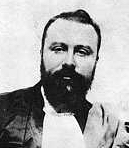 French physicist and philosopher and historian of science.
French physicist and philosopher and historian of science.
After studying at the École Normale Supérieure he taught at Lille (1887–1893), Rennes (1893–1894), and Bordeaux (1894–1916).
His extension and application of the thermodynamic potential to topics in chemistry ranks him among the founders of modern physical chemistry. His Traité d’énergétique générale (2 vol., 1911) aimed at a generalized, abstract thermodynamics that subsumed classical mechanics.
His major philosophical work, La théorie physique: Son objet, sa structure (1906), depreciates pictorial models in favor of an axiomatic approach, according to which a physical theory is not an explanation, but a system of mathematical propositions that represents experimental laws.
As a historian, Duhem discovered important currents of medieval thought in physics, cosmology, and astronomy, which he saw as precursors of the 17th century scientific revolution.
Major Works of Pierre-Maurice Duhem
Most of Duhem’s work has not yet been translated into English. Selections from his works in French are available in the following English translations:
– To Save the Phenomena: An Essay on the Idea of Physical Theory from Plato to Galileo (Chicago: University of Chicago Press, 1969)
– Medieval Cosmology: Theories of Infinity, Place, Time, Void and the Plurality of Worlds (Chicago: University of Chicago Press, 1985)
– The Evolution of Mechanics (Alphen an den Rijn: Sijthoff & Noordhoff, 1980)
– The Origins of Statics (Dodrecht: Kluwer Academic, 1991)
Theoretical physics
Among scientists, Duhem is best known today for his work on chemical thermodynamics, and in particular for the Gibbs–Duhem and Duhem–Margules equations. His approach was strongly influenced by the early works of Josiah Willard Gibbs, which Duhem effectively explicated and promoted among French scientists. In continuum mechanics, he is also remembered for his contribution to what is now called the Clausius–Duhem inequality.
Duhem was convinced that all physical phenomena, including mechanics, electromagnetism, and chemistry, could be derived from the principles of thermodynamics.[6] Influenced by Macquorn Rankine’s “Outlines of the Science of Energetics”,[7] Duhem carried out this intellectual project in his Traité de l’Énergétique (1911), but was ultimately unable to reduce electromagnetic phenomena to thermodynamic first principles.
With Ernst Mach, Duhem shared a skepticism about the reality and usefulness of the concept of atoms.[8] He therefore did not follow the statistical mechanics of Maxwell, Boltzmann, and Gibbs, who explained the laws of thermodynamics in terms of the statistical properties of mechanical systems composed of many atoms.
History of science

Nicole Oresme, a prominent medieval scholar. Duhem came to regard the medieval scholastic tradition as the origin of modern science.
Duhem is well known for his work on the history of science,[9][10][11][12] which resulted in the ten volume Le système du monde: histoire des doctrines cosmologiques de Platon à Copernic (The System of World: A History of Cosmological Doctrines from Plato to Copernicus).[13] Unlike many former historians (e.g. Voltaire and Condorcet), who denigrated the Middle Ages, he endeavored to show that the Roman Catholic Church had helped foster Western science in one of its most fruitful periods. His work in this field was originally prompted by his research into the origins of statics, where he encountered the works of medieval mathematicians and philosophers such as John Buridan, Nicole Oresme and Roger Bacon, whose sophistication surprised him. He consequently came to regard them as the founders of modern science, having in his view anticipated many of the discoveries of Galileo Galilei and later thinkers.[14] Duhem concluded that “the mechanics and physics of which modern times are justifiably proud to proceed, by an uninterrupted series of scarcely perceptible improvements, from doctrines professed in the heart of the medieval schools.”[15]
Duhem popularized the concept of “saving the phenomena.” In addition to the Copernican Revolution debate of “saving the phenomena” (Greek σῴζειν τὰ φαινόμενα, sozein ta phainomena[16])[17][18] versus offering explanations[19] that inspired Duhem was Thomas Aquinas, who wrote, regarding eccentrics and epicycles, that
Reason may be employed in two ways to establish a point: firstly, for the purpose of furnishing sufficient proof of some principle. […] Reason is employed in another way, not as furnishing a sufficient proof of a principle, but as confirming an already established principle, by showing the congruity of its results, as in astronomy the theory of eccentrics and epicycles is considered as established, because thereby the sensible appearances of the heavenly movements can be explained; not, however, as if this proof were sufficient, forasmuch as some other theory might explain them

Yeah bookmaking this wasn’t a risky decision great post! .
I consider something genuinely special in this web site.
Hi! This post couldn’t be written any better! Reading this post reminds me of my old room mate! He always kept chatting about this. I will forward this article to him. Fairly certain he will have a good read. Many thanks for sharing!